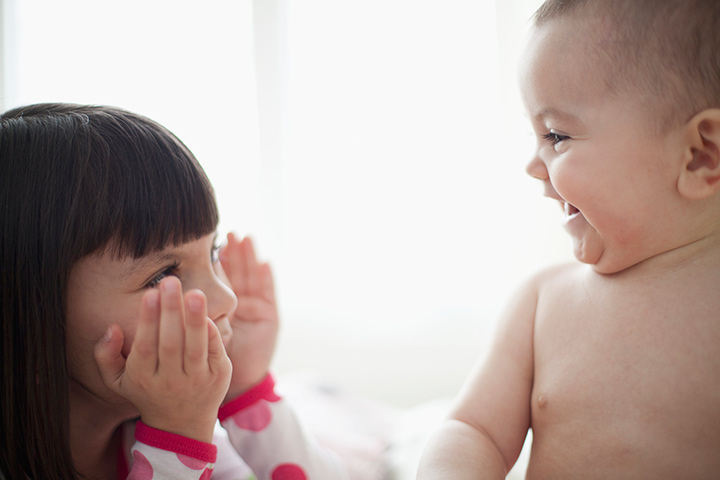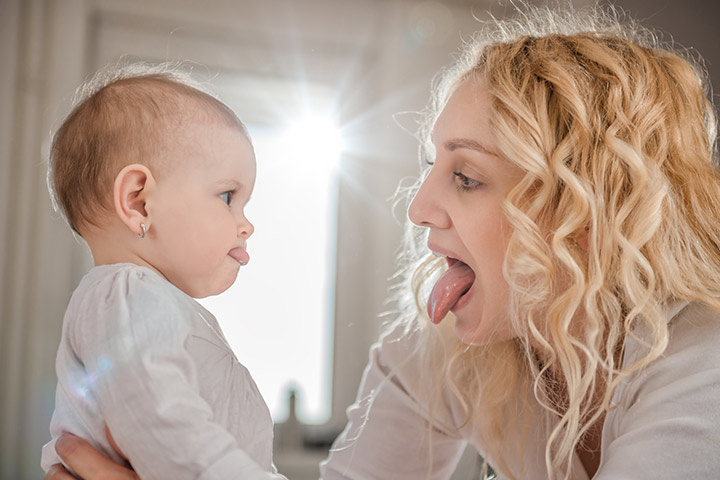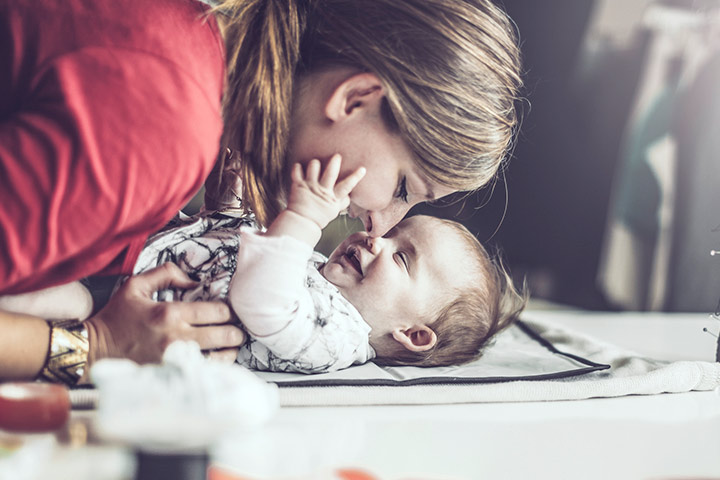Make My Baby Go Buh Buh Funny Video

"There is nothing more contagious than a baby's laughter"
There is no better feeling in the world than watching your baby laugh. A baby's laughter is contagious and can take the blues away. Every parent wants to know things that make babies laugh so that they can cheer up their little one more often and forge an everlasting bond.
Laughing is also the best medicine to keep ailments at bay and keep you free from stress. In this post, we share some easy ways to make a baby laugh. Try any of the ideas and have a good time.
When do babies laugh?
Babies first laugh around four months of age (1). It is unclear whether or not they can understand humor at this age. But by five months, they laugh in response to anything absurd.
They laugh independent of whether their parents are laughing or not. They seek everyone's attention with their smiles and laughter.
Laughing is good for your baby's health and is the best way to bond with them. So, make them laugh as often as possible..
Here is a quick guide on how to make babies laugh at each stage:
- Newborns to 12 months: Blow raspberries on your baby's belly, play peek-a-boo, pat-a-cake, make funny faces and voices
- One to two-year-olds: Do stupid antics, chase games or race games
- Two to four-year-olds: Recite funny rhymes, sing songs, and crack jokes
Ways To Make Babies Laugh
It's easy to make babies laugh or amuse them through simple games, which will also help them develop cognitive, emotional, and social skills (2).
-
- Blowing raspberries: Gently blow on your baby's skin, feet, or stomach and watch their reaction; when this is done on their stomach accompanied by a funny sound, they start giggling.
- Chasing: If your tiny tot has started crawling, chase them saying, "mama bear is out to get you." That can leave them roaring in laughter.
- Biting: Pretend as if you are nibbling on your baby's hand or leg, and they will find it ridiculous. Repeat the prank on their stomach, fingers, and toes.
- Physical games: Games that involve touch are useful for bonding with your baby and making them laugh. For example, you can play the 'steal your nose' game. Pretend you have stolen your baby's nose and show your thumb (as their nose) through your fingers. They are sure to laugh!
Image: iStock
- Peek-a-boo: Babies love the suspense and surprise element in this game. The moment you appear from behind the couch or screen, they burst into laughter. Using a bright-colored blanket to play peek-a-boo makes it exciting and funny for babies.
- Pat-a-cake: Make actions while you sing the rhyme 'pat-a-cake'. Clap your hands and alternately pat on your thighs and continue singing while laughing. Your baby is sure to respond with laughter.
- Little piggy: Use your little one's toes to play this game. Touch each one of your child's toes starting from the big toe and tell him 'the big toe went to the market' and end the game with the little toe saying 'the little toe says hee, hee, hee' which might end up in your baby saying 'ha ha ha'.
- Horse riding: Make your baby sit on your knees and move her up and down with a 'horse galloping sound' as if they are riding a horse. Your legs might hurt but your baby will just want it more and continue laughing.
- Tickling: Whether it's on their feet, stomach or armpits, tickling is a sure way to make babies laugh. Young babies (0-3 months) don't laugh when tickled, but older ones do.
Image: iStock
- Funny faces: Make funny faces by sticking your tongue out, making bunny teeth, using your hands to make imaginary figures and talking in a humorous tone. Dance and sing with a funny tone. They will all make your baby chuckle.
- Sounds: Strange sounds such as thwacking of newspaper on the head or slurping liquids, or uttering weird sounds elicit laughter. Even when you drop an object, the resulting sound can make babies laugh.
- Siblings or peers: If your baby has siblings then you just got your laughter champion right at home. Babies laugh when an older sibling or peers make funny faces. Seeing the pictures of babies in books also makes them laugh.
- Antics: Whether it is flinging things across, jumping on the couch, falling on the floor, or hitting something, babies invariably find it funny and end up in splitting laughter.
- Animals: Babies find animals amusing due to their unique appearance, strange sounds, and movements, which are all different from humans'. So, whenever a cat licks its paw, dog yawns or cow moos, they burst out laughing.
- Things: Babies laugh at random things, bright-colored toys and such interesting ones.
- Chuckle: Laughter is contagious, and why not. When you laugh, your baby will join you in the laughter challenge.
- Keep it on loop mode: One of the sure-shot ways to make your baby laugh is to sing. While singing, roll your eyes, play around with your baby's fingers, and make voice variations. Sing that song that your baby seems to love and sing it often — when you are putting your baby to sleep, when you are bathing them, and while feeding them.
- Show the baby an object: It should be one of their toys such as a teething ring or a ball they can grab. Allow the baby to examine the toy for a minute or two. Let them touch it and grab it to explore.
After a few minutes, cover the object with a cloth. If a baby has developed object permanence (3), they will be able to pull the cloth off and find the object. Pull the cloth off and smile. This will often make the baby laugh or giggle, as you have made the object re-appear.
Image: iStock
- Eskimo kisses: Rub your nose against your baby's nose and witness their blissful laughter.
- Bed bouncing: Let your baby lie on their back and shake the bed in a manner that it bounces up and down. Babies love that and laugh a lot.
- Pretending to hurt yourself: Take precaution while you do this because you might hurt yourself in the process. Pretend as if you have accidentally bumped into a wall or tripped on the carpet and this can leave your baby in giggles.
So, you make your baby laugh and they laugh out loud. But did you know that their laugh indicates something?
What Does Laughing Mean In Babies?
Laughing is an important milestone that indicates the baby's cognitive, social and emotional skills. Laughing, just like other basic activities, seems to evolve as babies grow and that reflects their development.
Laughing in babies at various stages
Let's look at what makes babies laugh at the different stages of their childhood (4) (5).
Three months: Babies learn by imitating. The mirror neurons in them imitate your actions, including your smile and laughter. So, they inevitably laugh out when you do. For example, when you play pat-a-cake, your baby imitates you and thereby learns from you. They also laugh when they are happy.
Six months: Infants can independently assess absurd situations as humorous. Once your baby's language skills start developing, they start understanding language and sounds and are amused when they hear funny words, noises, and actions. Dorky and silly faces elicit more laughter than a straight face.
Also, they laugh if the parent is laughing. Your laugh triggers a laugh in them.
Nine months: Babies begin to understand when something is out of the ordinary, for example, when you nibble at the nipple of their feeding bottle or wear your hat on your feet. Babies know that it is unusual and burst out laughing. They tend to laugh repeatedly at the same thing; so make sure that you repeat the antics many times and they will laugh each time as if it is a new thing.
What's more interesting at this stage is that the babies try to make you laugh with their tactics like "offering and withdrawing an object to a parent, or engaging a caregiver by using fake laughter".
12 months: As infants grow, they no longer depend on parents to assess funny situations. However, they still take their parents' laughter as a cue to laugh. They are particularly amused by odd sounds such as tearing a paper.
15-18 months: Babies display their cognitive and language skills once they cross the one-year milestone. They start understanding if anything's absurd. For example, when you put a bowl on your head as a hat, the baby might laugh out loud. Also, they are now more interested in making you laugh, and when you laugh, they laugh along.
One to two years:Children start understanding the 'order of things', and anything out of order becomes funny for them. They laugh when an adult tells a silly joke or makes up rhymes with nonsensical words. The child has also developed a bigger vocabulary than before and uses that to understand humor.
Although babies appear to laugh for no obvious reason, laughter is a sign of their overall growth. Their laughter is also a great stress reliever for you. So, if you're wondering how to make a baby laugh, all of the above suggestions and ideas will undoubtedly help you. To make your baby laugh and have some lovely moments together, try these crazy actions, such as blowing raspberries, making funny faces and sounds, and Eskimo kisses. Also, the most crucial rule to follow while doing so is to be natural, enjoy the moment, and have fun.
References:
MomJunction's articles are written after analyzing the research works of expert authors and institutions. Our references consist of resources established by authorities in their respective fields. You can learn more about the authenticity of the information we present in our editorial policy.
- Gina C Mireault et al; Social cognitive and physiological aspects of humour perception from 4 to 8 months: Two longitudinal studies.
https://pubmed.ncbi.nlm.nih.gov/28944500/ - The Importance of Play in Promoting Healthy Child Development and Maintaining Strong Parent-Child Bonds.
https://publications.aap.org/pediatrics/article/119/1/182/70699/The-Importance-of-Play-in-Promoting-Healthy-Child - M Keith Moore and Andrew N Meltzoff; Object permanence after a 24-hr delay and leaving the locale of disappearance: the role of memory space and identity.
https://pubmed.ncbi.nlm.nih.gov/15238047/ - Gina C. Mireault et al; Laughing Matters: Infant Humor in the Context of Parental Affect.
https://www.ncbi.nlm.nih.gov/pmc/articles/PMC4424150/ - Communication of Smiling and Laughter in Mother-Infant Play: Research on Emotion from a Dynamic Systems Perspective.
http://local.psy.miami.edu/faculty/dmessinger/c_c/rsrcs/rdgs/emot/CommSmiling1997.pdf
The following two tabs change content below.

Dr. Shashidhar is a qualified pediatrician and neonatologist currently practicing at St John's Medical College and Tiny Tots Clinic in Koramangala, Bangalore. He is a part of an accomplished team taking care of preterm and sick newborns until discharge and follow up. He is a teacher at various levels from undergraduate to post-doctoral medical students. Keenly interested in different aspects... more

Kalpana Nadimpalli graduated in English Literature and Psychology. Her fascination for the corporate world made her do a Masters in Business Administration. Being a mother of two boys, she could naturally fit into the shoes of a writer at MomJunction. She wrote articles on new parenting and relationships. Previously, Kalpana worked as a product information specialist and technical writer. During her... more
Source: https://www.momjunction.com/articles/funny-ways-to-make-your-baby-laugh_00349624/



Post a Comment for "Make My Baby Go Buh Buh Funny Video"